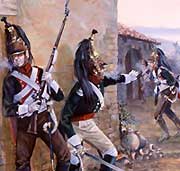Napoleonic Invasions and the Return of the Absolutism
1808 - 1868
 Valencian XIX century went along with most European trends of the time.
The liberalism struggled with the reactionary absolutism in the wake of
the French Revolution, finally securing concessions from the monarchy
in the middle of the century, parallel to the growing nationalism. At
the same time, over the course of XIX century Valencia successfully industrialised
and expanded.
Valencian XIX century went along with most European trends of the time.
The liberalism struggled with the reactionary absolutism in the wake of
the French Revolution, finally securing concessions from the monarchy
in the middle of the century, parallel to the growing nationalism. At
the same time, over the course of XIX century Valencia successfully industrialised
and expanded.
Following the 1808 Madrid Rebellion, Napoleon forced Carlos IV to abdicate.
This sparked a nationalist revolt in Valencia, led by a priest Padre Rico.
Armed mob slaughtered French POWs and prepared to meet General Moncey
who was swiftly moving towards the city. The first Bullring and the Royal
Palace by the Jardines de Viveros were pulled down to deny fortifications
to the French.
Moncey's attack was successfully repelled and it was not until 1812 that
the French under Gen. Suchet appeared again at the walls of Valencia.
They managed to take the city only from the second attempt, after much
bombardment (the Torres
de Quart were one of the main entrances of the French troops, still
bearing the scars of the cannon balls).
Suchet governed Valencia wisely, with a whole hearts and minds routine,
respecting the local populace and traditions so much that to this day
the celebrations of Semana Santa in Valencia pay
tribute to his troops.
The French left Valencia in 1813, when the tides of war turned.
 When
the Spanish monarchy was restored with the coronation of Ferdinand VII,
absolutism flourished and repressions against liberalism were widespread.
This lead to further radicalisation of the politics until concessions
were finally made by Queen Isabel, who governed with a moderate hand. When
the Spanish monarchy was restored with the coronation of Ferdinand VII,
absolutism flourished and repressions against liberalism were widespread.
This lead to further radicalisation of the politics until concessions
were finally made by Queen Isabel, who governed with a moderate hand.
Over this period, Valencia was able to exercise a certain amount of independent
armed struggle. The bourgeoisie elite run militias which successfully
repelled skirmishes of the Carlists (radical monarchists) in Valencian
countryside.
However, the civil unrest was further fermented by economic decline.
Valencia heavily relied on the silk trade which flourished in XVIII
century. But Valencia failed to keep with the times, the taxes were
high and once an epidemic struck the silk work population, the silk economy
came to an end.
|